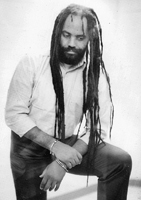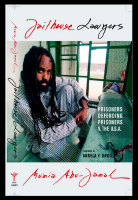
zurück "zu Bücher von und über Mumia Abu-Jamal"
Impressum Datenschutzerklärung

Bücher von und über Mumia Abu-Jamal

Jamal, Mumia Abu-: Jailhouse Lawyers
Prisoners Defending Prisoners V. the USA.
280 Seiten, br. 2009
ca. 16.95 $ - ISBN-13: 978-0-87286-469-6
Erscheint zu Mumias Geburtstag am 24. April 2009 in den USA
2,3 Millionen Gefangene sitzen derzeit in den USA im Gefängnis. Viele von ihnen leben und arbeiten im sog. "Gefängnisindustriellen Komplex". Neokonservative Strafdiskurse,entsprechende Gesetzesänderungen und ein grosses Interesse privater Firmen führten in den letzten 30 Jahren zu einer Explosion der Gefangenenzahlen, was in der Öffentlichkeit nur all zu oft ausgeblendet wird.
Es gibt eine grosse Zahl wissenschaftlich als auch politisch motivierter Untersuchungen über dieses Phänomen (1). In den USA sitzen heute mehr Menschen in Gefängnissen als in irgend einem anderen Staat der Welt, sowohl prozentual als auch in absoluten Zahlen.
Allerdings ist allen Untersuchungen eines gemein: sie sind von ausserhalb der Gefängnisse geschrieben und stützen sich in der Mehrheit auf staatliche Statistiken.
Im April 2009 erscheint ein neues Buch von Mumia Abu-Jamal: "Jailhouse Lawyers Prisoners Defending Prisoners v. the U.S.A." Mumia Abu-Jamal (2), selbst politischer Gefangener im Todestrakt von Pennsylvenia, schreibt hier über Kämpfe von Gefangenen innerhalb des Gefängnisindustriellen Komplexes sowie über die wichtige Rolle sozialer Bewegungen. Er beleuchtet deren beider Rolle sowohl historisch als auch aktuell.
Besonders die Arbeit von Gefangenen, die angesichts mangelnden juristischen Beistands für sich selbst und Mitgefangene juristisch aktiv werden ("Jailhouse Lawyers), beleuchtet Mumia aus jahrzehntelanger eigener Erfahrung. Viele aktuelle Geschichten finden Eingang in die Darstellung. Mumia verbindet damit auch die Hoffnung, dass mehr Kontakte zwischen Aktivist_innen und Gefangenen entstehen und eine breite Öffentlichkeit über den häufig ausgeblendeten Alltag der 2,3 Millionen US-Gefangenen erfährt.
In einem kürzlich veröffentlichten Interview (3) erklärt Mumia Abu-Jamal die Bedeutung der Jailhouse Lawyers. Aus einer "Schattenwelt" heraus organisieren und kämpfen sie ohne öffentliche Wahrnehmung für minimalste Rechte, immer in dem Wissen, dass die Vergeltung dafür direkt vor ihrer Stahltür wartet. Viele der selbst erlernten Rechtsanwälte können nicht lesen oder schreiben bzw. müssen es erst erlernen. Ihre Kampferfahrungen hält der Autor für eine wichtige Voraussetzung, sowohl für Gefangene als auch Aktivist_innen sozialer Bewegungen.
In den USA erscheint das Buch zu Mumias Geburtstag am 24. April 2009. Der Verlag heisst City Lights (4). Angela Davis, selbst jahrzehntelange Anti-Knast-Aktivistin und ehemalige politische Gefangene, schrieb das Vorwort.
Vor dem Hintergrund der sich ausweitenden industriellen Verwertung von Gefangenen in vielen Ländern können die Erfahrungen der vergangenen Jahrzehnte aus den USA sowohl Anti-Repressionsgruppen als auch sozialen Bewegungen von grossem Nutzen sein.
Anmerkungen:
- z.B. Christian Parentis "Lockdown America: Police and Prisons in the Age of Crisis" (1999) ISBN 1-85984-303-4
mehr hier...
oder auch Angela Davis "Eine Gesellschaft ohne Gefängnisse? Der gefängnisindustrielle Komplex der USA." Schwarzerfreitag 2004, ISBN 3-937623-32-9 - Indymedia Artikel 2007 "Mumia Abu-Jamal: 26 Jahre Kampf um Freiheit"
- Z-Mag online Interview mit Mumia Abu-Jamal
- Mehr Infos, einige Kurzkritiken sowie das Deckblatt sind hier zu finden
- Eine weiter Kritik gibt es hier
- eine weitere Rezension von J. Pattrick O'Connor
- Prisonhouse of Nations: A Review of Mumia Abu-Jamal'sJailhouse Lawyers, By Richard Vogel on OpEDnews
- Guest book review by Mischa Geracoulis
To borrow from an old African-American proverb, Mumia Abu-Jamal "speaks truth to power" in his latest book on jailhouse lawyering, the American legal system, and the prison-industrial complex. Journalist, activist, and author Abu-Jamal writes a startling expose' on otherwise shrouded subject matter, thusly inaugurating this book unto an exemplary class by itself. Indeed, the power of his truth upholds the long-neglected promise of transformation awaiting the domains of justice.
Abu-Jamal has been imprisoned for over two decades in a Pennsylvania correctional facility - the very institution famous for employing Charles Graner, prison guard and Army reservist convicted of prisoner abuse in the Abu Ghraib prison in Iraq. This same prison - which employs a staff that's 95% Caucasian to oversee the 98% African-American inmate population - is notorious for hosting an environment fraught with institutionalized racism and abuse. This is the atmosphere in which Jailhouse Lawyer was conceived. Absorbing this crucial detail, it's indeed awesome that Abu-Jamal was able to carry out his project.
Based on this information, the reader might expect text that was produced in such a volatile environment to translate into defensive, derogatory, or perhaps censored reading material. On the contrary, Abu-Jamal writes with incisive equanimity while presenting penetratingly disturbing facts. The information he discloses is little known in mainstream society, making Jailhouse Lawyers an essential read.
What exactly is a jailhouse lawyer? He or she is an inmate who has never practiced law in the traditional sense or had any formal education thereof, but who aids other inmates with issues related to their sentencing, addresses prison conditions, and represents themselves in legal proceedings.
The jailhouse lawyer is self-educated. He or she spends every possible moment devouring law books, such as The Jailhouse Lawyers Handbook (Center for Constitutional Rights and the National Lawyer's Guild, 2003) and The Jailhouse Lawyers Manual (Columbia Law School, published biannually), by taking paralegal correspondence courses, and apprenticing under other jailhouse lawyers. (The very fact that these manuals are produced is indicative of a glaring need for legal counsel and assistance among prisoners.)
Jailhouse lawyers work for free, at an acute disadvantage, and with persistent exposure to prison-issued retaliation. More often than not, he or she is consigned to solitary confinement, AKA "the hole" for pursuing this work. In prison (and, as is suggested, in the greater society), unity is feared; hence, isolation is punishment. The author points out that despite these obstacles, the jailhouse lawyer is among the rare few to actually affect positive and far-reaching prison reform, as well as reversals of convictions. Abu-Jamal relays an adage popularized in the lawyer industry that says "one who acts as his own lawyer has a fool for a client." Surprisingly, these "fools" (jailhouse lawyers) often emerge victorious.
At its core, jailhouse lawyering - necessitated by the inequality in America's legal and prison systems - is a class and social struggle, and a human rights movement. With the giant increase in America's prison population since the 1970s, Abu-Jamal looks at the political rhetoric on the various "wars" within our culture. The so-called "war on drugs" is one example of a campaign waged, not to rehabilitate people hooked on drugs, but to grant more state power to incarcerate. His examination gives rise to questions as to whether the real war might be on our nation's own citizenry - in particular, its minorities. Statistics show that the number of incarcerated women has surged 300% (as compared to men at about 200%), and in overall prison demographics, African-Americans eclipse all other racial and ethnic groups.

